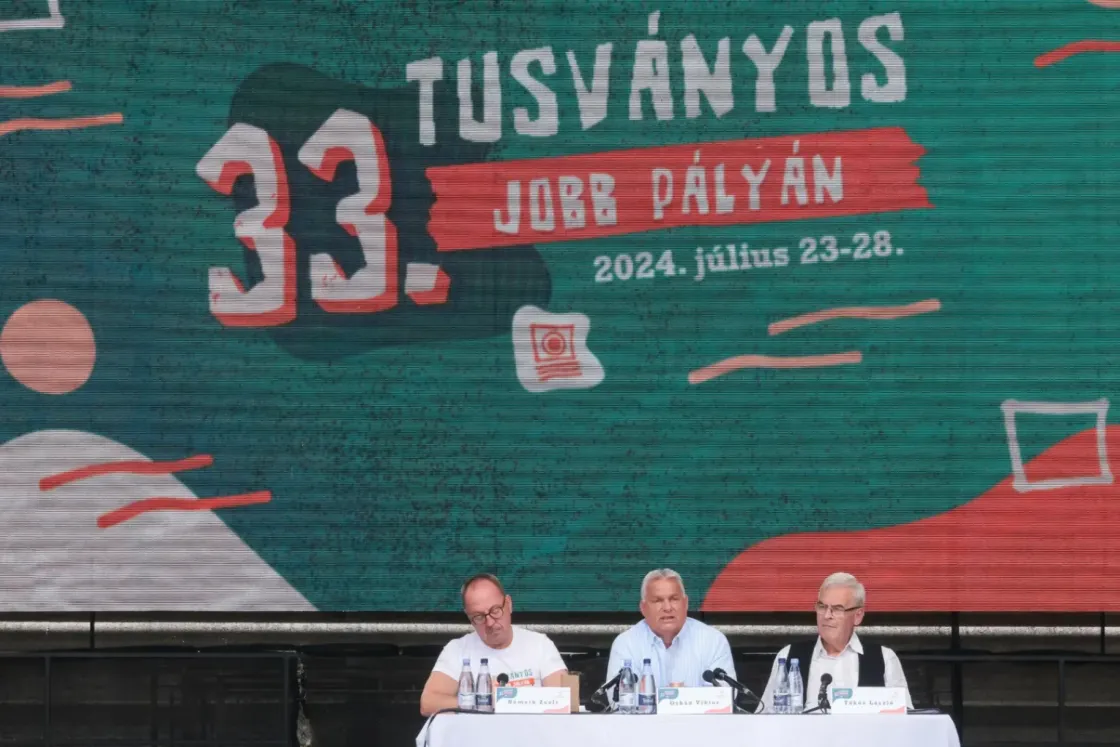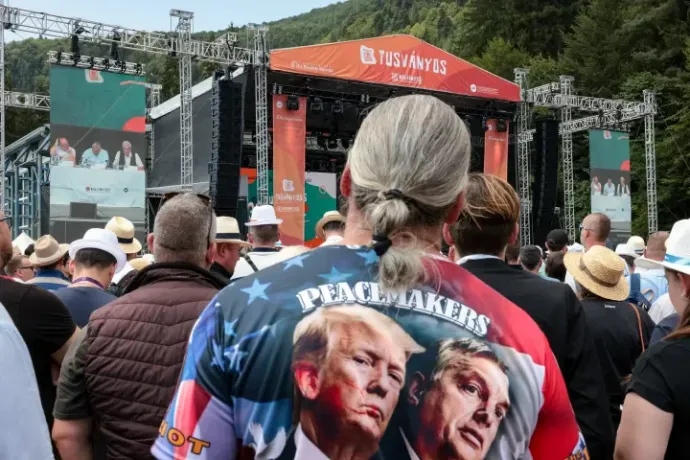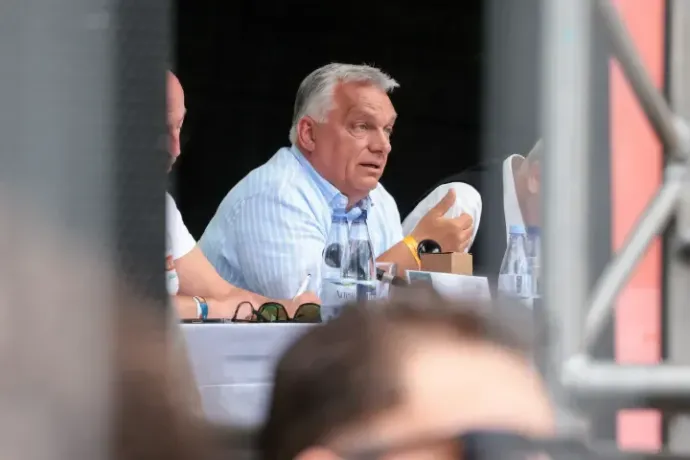
The Bálványos Free Summer University and Student Camp (more commonly known as Tusványos) has been organised in Baile Tusnad (or Bálványos) Transylvania since 1990. It has become a large-scale intellectual workshop of the Carpathian Basin, with tens of thousands in attendance. It was originally intended to promote cross-border cooperation, Romanian-Hungarian dialogue and a cultured Hungarian-Hungarian political exchange. According to critics, in recent years it has become a place where members of the Budapest government and representatives of the intellectual establishment close to them express their ideas without substantive debate. It was here that Viktor Orbán first spoke about building an “illiberal democracy’ in 2014, and his speeches have become the highlight of the event and are largely considered to be marking the direction of Fidesz’ politics for the year ahead. This year’s speech was no different.
Speaking at a festival in Tusnádfürdő, Romania, on Saturday morning, Viktor Orbán gave a speech that lasted more than an hour. In it, he discussed the ongoing Russian-Ukrainian war, spoke about a coming shift in the global order “we have not seen for 500 years”, and finally he presented what he believes should be Hungary’s "grand strategy" in this changing world order.
Orbán noted that the EU's founding treaty states that the goal of the European Union is peace. But what we see right now is that Brussels wants to create peace by constantly supporting war. This reminded the Hungarian Prime Minister of Lenin, who said that the end of communism would mean the death of the state.
"Just as we didn't understand Lenin's thesis, now we don't understand the people in Brussels during our meetings," he said.
He said that Trump is already at the gates and if Europe fails to switch to a policy of peace, it will have to do so later on by admitting defeat, with a sense of shame and taking the responsibility for its policies by itself. Orbán believes that “the process of fermentation has begun”, the Ukrainians have already put things together and are now trying to move towards peace.
The Prime Minister spoke on three major subjects, expounding at length on each of them.
He spoke about the war because, in his view, it reveals the reality in which we live.
- This was not visible and could not be described until now, but the flashing lights of the war missiles have made it visible and possible to describe.
- What will happen after the war? Is there a new world coming or will the old one continue?
- And if there is a new world, how should Hungary prepare for it?
Orbán cosiders "the war our red pill" from "The Matrix". In the film, one can choose between two pills, and if one swallows the red one, they can descend into reality. And in this environment, the media's distortions, the politicians' tactical deceptions and the conspiracy theories lose their power, and we are left with the pure reality.
Ukraine is strong, and Russia is under rational leadership
The reality is that both parties are suffering brutal losses in the war, and yet they refuse to reconcile. Why? For one thing, because they both believe they can win. On the other hand, both sides are fuelled by their own actual or perceived reality. Ukraine is in self-defence and is fighting a war of independence. Russia, on the other hand says that NATO has implemented serious developments in Ukraine and they do not want to see NATO troops, NATO weapons on the Russian-Ukrainian border. And as neither side will give up fighting the war, there's a straight road to escalation. This means that peace can only be brought from the outside.
Until recently, we've gotten used to the US seeing China as its main challenger, and yet now we see it waging a proxy war against Russia. The question arises: what is the logic of putting two such great states into one hostile camp? – Orbán wondered, but also acknowledged that Ukraine's strength and resilience has exceeded all expectations.
About Ukraine, he said that 11 million people have left Ukraine since 1990, it has been ruled by oligarchs, corruption is rampant, the state had essentially ceased to function, and yet it has shown an unprecedentedly successful, strong resistance – Ukraine is in fact a strong country. In his view, until now Ukraine saw itself as a buffer zone, which is a "gloomy state of mind" to be in, but at this point the prospect of belonging to the West has appeared. Its new mission now is to be the eastern frontier guard of the West.

"Russia, meanwhile, is different from how we used to see it, it's different from how we were made to see it. Russia's economic viability is outstanding and it is under extremely rational leadership", Orbán continued. In reality, the EU sanctions are not working, he said, despite promises to the contrary from Brussels. "Everyone has a plan until they get punched in the mouth", he said, citing Mike Tyson. One must see that Russia has been adapting to the sanctions since the Crimea crisis in 2014, and they were ready to function on their own. The country has shown great technical, economic and social flexibility according to the Hungarian Prime Minister.
European politics has collapsed
Meanwhile, according to Orbán, "European politics has collapsed" and Europe has given up on defending its own interests. Europe, he says, is doing nothing other than following the foreign policy of the American Democrats unquestioningly, even at the cost of self-destruction. In his opinion "the sanctions have made the EU economy unable to compete, and in doing so the EU has bowed to the US. Another reason why European politics has collapsed is that the EU used to be built around the Paris-Berlin axis, but since the war in Ukraine began, it has been dominated by the London-Warsaw-Kyiv axis and the axis between the Baltic and Scandinavian states.
Orbán also spent a few minutes commenting on Poland and said that the country wanted to free itself from German and Russian pressure by inviting the Americans in, so it became a US base in Europe. It was for this strategy that Poland gave up the strategy of the V4, which had accepted the Franco-German axis. According to the Prime Minister,
the Poles are "pursuing the most hypocritical and deceitful policy in Europe": they are lecturing us morally, criticising us for our relations with Russia, while at the same time buying gas from Russia, albeit through intermediaries.
As the Prime Minister sees it, the real task for us is to try to understand the West again in light of the war, because from our point of view we see it as irrational. Here he again pointed out that Central Europe is made up of nation states which are sovereign, which share common values and biblical foundations. Meanwhile the West believes that these no longer exist, and denies that there is such a thing as a common culture. This perception doesn't include public morality – "anyone who saw the opening of the Olympics on Friday could see that. According to his train of thought, Western "post-national" thinking focuses on the self instead of God, family and country. So "what you get is not greatness, but conceit", which "lead to the emergence of a new type of man, the aggressive dwarf".
Brussels is occupied by a liberal oligarchy
Thinking in terms of the nation state is forcing us into strategic realism, he continued, while post-national thinking is faced with the problem of elitism and populism. "The elites are condemning the people for drifting towards the right." Then the people, responding to this, accuse the elites of not caring about what is important to them. According to Orbán, Brussels remains under the occupation of a liberal oligarchy, and the EU centre is back to having three categories: the banned, the tolerated and the supported.
"We belong to the banned category, and our domestic opponents belong to the supported category".
This is especially true of the Tisza Party, which has joined the European People's Party, is in the latter category, Orbán said. According to the Prime Minister, Putin's biggest weapon, his soft power, is the existence of LGBTQ propaganda in the West, because it makes them (Russia) even more popular and attractive.
A shift not seen in five hundred years
In the second part of his speech, the Hungarian Prime Minister spoke about the impending "change in the global order". According to him, the shift that's coming is something that hasn't been seen for 500 years, and this situation requires intellectual courage. The world order is going to undergo a complete transformation in the coming decades and centuries, starting in Asia, and Asia will become the definitive centre of the world. Asia already has a demographic and technological advantage, but it also has more capital, more money, the biggest companies, research institutes and stock exchanges.
In his speech, Orbán mentioned that he had spoken with Donald Trump on the phone the day before, who sent his greetings to those gathered at the Tusványos festival. Trump is also working on finding an answer to this situation. Trump's experiment is the last chance for the US to maintain its pre-eminence in the world. If Donald Trump wins now, and his vice president is elected president twice afterwards, the national strategy could be completed in 12 years, the Prime Minister said.
As the Hungarian PM sees it, there could be more than one European response to this situation. One is for Europe to remain a subordinate of the US. The second option is strategic autonomy, to become part of the system of world change. After all, we are talking about 400 million people. This will require European self-sufficiency, which will not be possible without nuclear energy, a new capability for attracting capital, major infrastructure development, a strong military alliance, a military industry, and a new post-war settlement with Russia, and 'the EU must give up the idea of itself as a political project in its own right'. In this construct, Ukraine cannot be a member of either the EU or NATO.

How Hungary should move forward in the coming new global order
The Prime Minister then turned to how he believes Hungary should move forward in this new situation. He said that they had already had small strategies in place, usually reaching up to 2030. But this is not enough at a time of a changing world order, we need a grand strategy for a longer timeframe. Drawing this up is the task of Balázs Orbán, the Prime Minister's political director. This grand strategy is not yet in a presentable state, the PM admitted, because its language is too intellectual. It will take a good six months to make the strategy understandable for everyone.
Still, Orbán presented some points from this material:
- The key element of the Hungarian strategy is connectivity. The keyword for Hungarian economic policy is connectivity. We will not allow ourselves to be locked into the Eastern and Western world economies, we must stay connected to both according to Orbán. We will not get involved in a war against the East, or in technical and trade blockades, but we will pursue our own path.
- When it comes to national sovereignty, the Prime Minister said it was important for each sector to have its own champions and competitive medium-sized enterprises underneath. In recent years they have built a pyramid, at the top of which is the national banking sector, the energy sector, the food industry, agricultural raw material production, information technology, telecommunications, media, construction, real estate development, pharmaceuticals, the defence industry, logistics and the university education sector. The domestic small and medium-sized enterprises are below these: in 2010 there were 3,000 SMEs, now there are 15,000. The Prime Minister promised to launch a major programme for SMEs when peace comes.
- Orbán said that the economic basis for sovereignty also means that we must strengthen our financial independence, we must bring our debt down to closer to 30 percent, not 50-60 percent, and we must become a regional creditor.
- We must not switch to a service-oriented economy. The service sector is important, but Hungary must retain its character as a production centre, because only here can the domestic workforce find 100 percent employment. We must not make the mistake of the West by having certain manufacturing jobs performed by guest workers. If this happens in Hungary, it will trigger a social disintegration that will be difficult to stop.
- Orbán said that we must be demographically self-sustaining by 2035, and that in 2025 the tax allowances granted to those with children should probably be doubled within a year, not in one step, but in two. We need to keep drawing people from Western Europe who want to live in a Christian country. Society must be middle class, families must be well-off.
- Hungarian villages must be preserved with urban services being provided in the villages too.
- Part of protecting our sovereignty is not assimilating, not going with the flow, but going our own way.
- The grand strategy must not be based on a small Hungary, it must include all Hungarians living in the world. Here Orbán promised that in the foreseeable future all support provided for Hungarians, such as family support, will also be made available to Hungarians living outside the country's borders. He did not specify an exact date for this.
FInally, Orbán said that they will not be the ones to complete this 20-25 year long process, but it will mostly be the courageous young people with nationalist sentiment who are currently in their 20s and 30s. According to Orbán, these plans will certainly be attacked from the outside, they will be called into question, but this is a fight that must be taken up, because the 'self-indulgent liberal politicians in their slim-fit outfits, with lattes, avocados and food that's free from everything' will be the ones on the other side.
If you want to make sure not to miss quick, accurate and impartial news from Hungary in the future, subscribe to the Telex English newsletter!